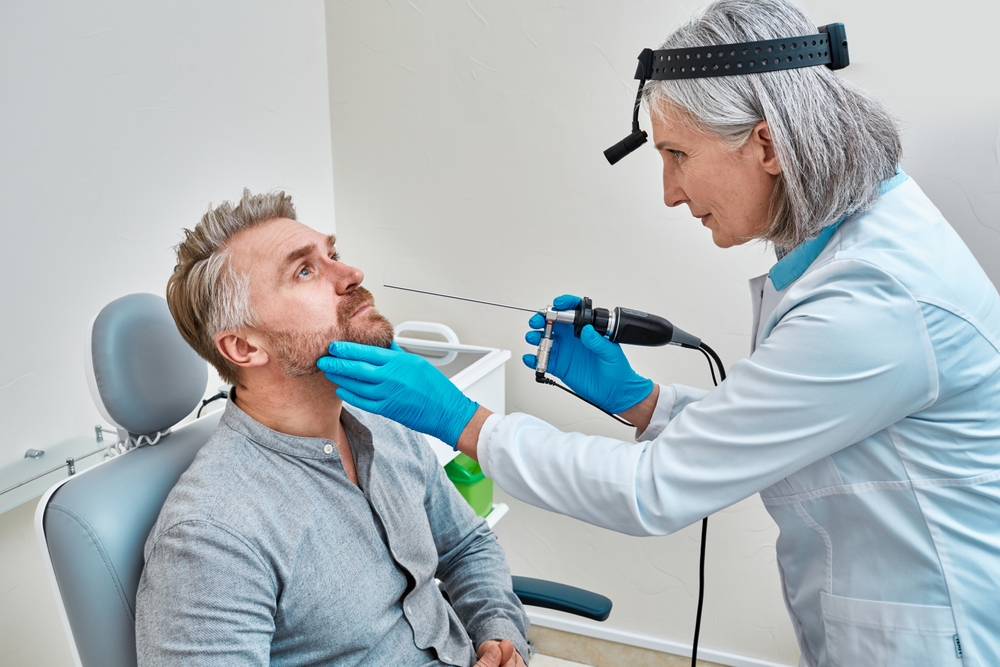
Are you experiencing facial pain? Is your nose often congested?
When your ENT specialist needs to look deeper into your nasal and sinus passages to get to the bottom of your symptoms, they use a nasal endoscopy. Nasal endoscopies are quick, straightforward procedures performed at your ENT specialist’s office without downtime.
Keep reading to learn more about nasal endoscopy and why you may need one!
What is a Nasal Endoscopy?
Nasal endoscopy, also called rhinoscopy, is a simple and effective procedure that allows your ENT specialist at Southern Indiana ENT to have a thorough visual examination of your sinus and nasal passages. It’s performed by inserting an endoscope inside your nose and sinuses.
An endoscope is a rigid or flexible tube with a tiny light and camera. The camera captures detailed images that are projected and magnified on a screen.
A nasal endoscopy eliminates the guesswork in diagnosis. It allows your ENT specialist to determine what’s causing your symptoms and tailor the best treatment to your needs.
Why Would You Need a Nasal Endoscopy?
Your ENT specialist may recommend a nasal endoscopy if you have:

- Facial pain
- Headaches
- Nasal polyps
- Nasal tumors
- Nasal blockage
- Nasal congestion
- Frequent nosebleeds
- Nasal and sinus infection
- Decreased sense of smell
- Cerebrospinal fluid (CSF) leak
While nasal endoscopy is often a diagnostic tool, it can also be used for certain procedures such as:
- A biopsy-obtaining tissue sample
- Removing a foreign object from the nose
- Treating nasal polyps, sinus infections, or nasal tumors
- Monitoring the progress of some treatments like sinus surgery
How Should You Prepare for a Nasal Endoscopy?
No special preparations are usually required for a nasal endoscopy. Your ENT specialist will likely instruct you on what you should and shouldn’t do before nasal endoscopy.
Ensure you tell your ENT specialist about any medications you take, including supplements, vitamins, and over-the-counter medications. You may be asked to temporarily discontinue using certain medications before the procedure. These might include blood thinners.
What Should You Expect During a Nasal Endoscopy?

During the procedure, you’ll likely be seated. Your ENT specialist will spray a decongestant and topical anesthetic on the inside of your nose.
The anesthetic will numb the area. On the other hand, the decongestant will shrink tissue within your nose, enabling the endoscope to pass smoothly through your sinus and nasal cavities.
Once you’re numb, your ENT specialist will insert the endoscope into one nostril and gently push it to the back of your nose. If you feel uncomfortable, let your ENT specialist know.
They may adjust the endoscope, use a smaller one, or apply more numbing medicine. Your ENT specialist will then guide the endoscope through your sinus and nasal passages, carefully searching for abnormalities.
The small camera on the endoscope captures images of the area being examined, and projects magnified images on a larger screen. Your ENT specialist may repeat this several times on the same nostril. Each iteration lets them view different parts of your nasal cavity and sinuses.
They’ll then repeat the same process on the other nostril. If necessary, your ENT specialist will take a tissue sample, which will be sent to the lab for analysis.
While you may experience slight pressure during the procedure, nasal endoscopy shouldn’t hurt. The procedure takes less than five minutes to complete.
What are the Side Effects of Nasal Endoscopy?
Nasal endoscopy is a low-risk procedure. However, as with any procedure, there might be side effects. Some of the side-effects of nasal endoscopy may include:
- Bleeding
- Fainting
- Allergic reaction to the anesthetic or decongestant
Very rarely, some people develop an infection. Contact your ENT specialist at Southern Indiana ENT if you have nausea, chills, fever, or other signs of an infection after the procedure.
What to Expect After Nasal Endoscopy
The anesthetic spray may run from your nose into your throat, leaving you with a bitter taste. The numbing medication may also affect your throat and the roof of your mouth. This wears off within 30 to 60 minutes.
When that’s the case, you shouldn’t drink or eat until the numbness disappears completely. You may experience mild soreness in your nose that should resolve within a day or two.
Patients typically leave the office shortly after the procedure is done. There’s no downtime, so you can resume your usual routine immediately.
The Results of Nasal Endoscopy

Your ENT specialist can review the results with you right away and develop a personalized treatment plan if needed. If they remove a tissue sample, the results may take several days to return.
Your ENT specialist may sometimes require additional information to create your treatment plan. Depending on the results of your nasal endoscopy, they may order further testing, such as a CT scan.
Follow all post-procedure instructions about medications and follow-up appointments. In many instances, they’ll arrange another nasal endoscopy to check your progress.
Nasal Endoscopy at Southern Indiana ENT
Nasal and sinus issues can cause severe discomfort, leaving you feeling miserable. A nasal endoscopy at Southern Indiana ENT allows our team to provide an accurate diagnosis and design an effective treatment plan so you can find lasting relief.
Are you tired of dealing with recurring nasal or sinus problems? Schedule an appointment today at Southern Indiana ENT in Columbus and Seymour, IN, to determine if you need a nasal endoscopy. Isn’t it time to breathe and feel better?

